Journey Through the World of Boerboel Dogs
Introduction to the Boerboel Dog
 Welcome to the ultimate guide to the Boerboel Dog, a breed known for its strength, loyalty, and protective nature. This captivating breed has a rich history, hailing from South Africa where it was developed to guard homesteads and livestock. The Boerboel's distinctive appearance, coupled with its gentle disposition towards family, makes it a unique and beloved companion.
Welcome to the ultimate guide to the Boerboel Dog, a breed known for its strength, loyalty, and protective nature. This captivating breed has a rich history, hailing from South Africa where it was developed to guard homesteads and livestock. The Boerboel's distinctive appearance, coupled with its gentle disposition towards family, makes it a unique and beloved companion.
Boerboels are renowned for their imposing size and robust build. With a powerful stance and a distinctive square head, they exude an air of confidence and authority. Beneath this impressive exterior lies a heart full of devotion and a strong desire to protect their loved ones. Their loyalty and protective instincts make them a cherished addition to families seeking a steadfast guardian.
Considerations Before Choosing a Boerboel Dog
Before bringing a Boerboel into your life, it's essential to consider a few important factors. While their loyalty and protective nature make them excellent family companions, their size and strength require responsible ownership. Boerboels thrive in homes with experienced dog owners who understand their needs and can provide the guidance and structure they require.
Interesting and Fun Facts about the Boerboel Dog
Did you know that the Boerboel is also known as the "South African Mastiff"? This nickname highlights their impressive size and lineage as descendants of mastiff-type dogs. Another intriguing fact is that the Boerboel's name originates from two Dutch and Afrikaans words: "boer" meaning farmer and "boel" meaning dog. This name perfectly encapsulates their historical role as faithful guardians of farms.
Breed Background and History
Originating in South Africa, the Boerboel Dog has a fascinating history intertwined with the country's colonial past. Bred to protect farms from predators, these dogs have a heritage as rugged and resilient as the landscapes they once roamed. Over generations, the Boerboel evolved into a trusted companion, blending its guardian instincts with a gentle temperament suited for family life.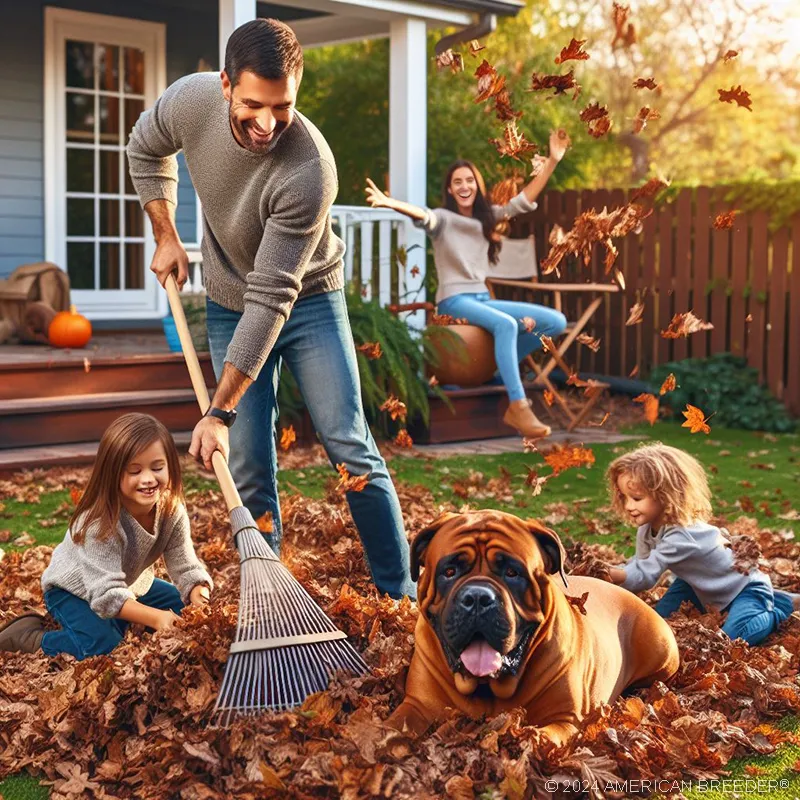 As an integral part of South African culture, the Boerboel has played a significant role in preserving rural livelihoods. These dogs have stood as silent sentinels, protecting livestock and crops from a variety of threats. Their historical significance as working dogs not only shaped their physical attributes but also ingrained a strong sense of duty and loyalty that remains a hallmark of the breed today.
As an integral part of South African culture, the Boerboel has played a significant role in preserving rural livelihoods. These dogs have stood as silent sentinels, protecting livestock and crops from a variety of threats. Their historical significance as working dogs not only shaped their physical attributes but also ingrained a strong sense of duty and loyalty that remains a hallmark of the breed today.
Purpose and Original Use of the Boerboel Dog
The Boerboel's original purpose was to protect homesteads and livestock from predators and intruders. Bred to be independent thinkers and capable decision-makers, they could assess threats and take action without constant human guidance. Their ability to navigate the challenging landscapes of South Africa while keeping watch over their charges showcases their intelligence and adaptability.
Appearance of the Boerboel Dog
Boerboels are imposing dogs, known for their size, strength, and distinctive appearance. Adult males can weigh between 150 to 200 pounds, while females range from 120 to 160 pounds. Their muscular build and well-proportioned body give them an impressive and authoritative presence. Despite their robust physique, their movements are surprisingly agile and coordinated.
Their short, dense coat serves as protection against the elements, requiring minimal grooming. Boerboels exhibit a variety of coat colors, including shades of brown, brindle, and fawn. Some may have a black mask that enhances their regal and powerful look. Their expressive eyes reflect their intelligence and convey a sense of understanding.
Temperament and Personality of the Boerboel Dog
 Boerboels are renowned for their balanced temperament, blending protective instincts with loyalty and affection for their families. Their natural guardianship extends to children, whom they often regard as part of their flock. While they are inherently watchful and alert, they're also gentle and patient with those they consider their own.
Boerboels are renowned for their balanced temperament, blending protective instincts with loyalty and affection for their families. Their natural guardianship extends to children, whom they often regard as part of their flock. While they are inherently watchful and alert, they're also gentle and patient with those they consider their own.
Their energy levels are moderate, making them adaptable to various lifestyles, from active outdoor adventures to quiet evenings at home. Their sociable nature makes them well-suited for families, as they thrive on companionship and interaction. However, their protective instincts may lead them to be cautious around strangers, necessitating early socialization to ensure positive interactions.
Trainability and Intelligence of the Boerboel Dog
The Boerboel's intelligence and willingness to please make them trainable companions. However, their independent streak requires a firm and consistent training approach. Positive reinforcement methods work best, as they respond well to praise, treats, and play as rewards. Engage their minds with varied activities to prevent boredom and ensure a well-rounded training experience.
Their natural protective instincts and loyalty can sometimes result in guarding behaviors, making early socialization and training crucial. Teaching them to differentiate between genuine threats and everyday situations is essential to prevent overprotective behaviors. With patience and dedication, the Boerboel's intelligence and problem-solving abilities can be channeled into a well-mannered and responsive companion.
Practical Considerations for Boerboel Dog Owners
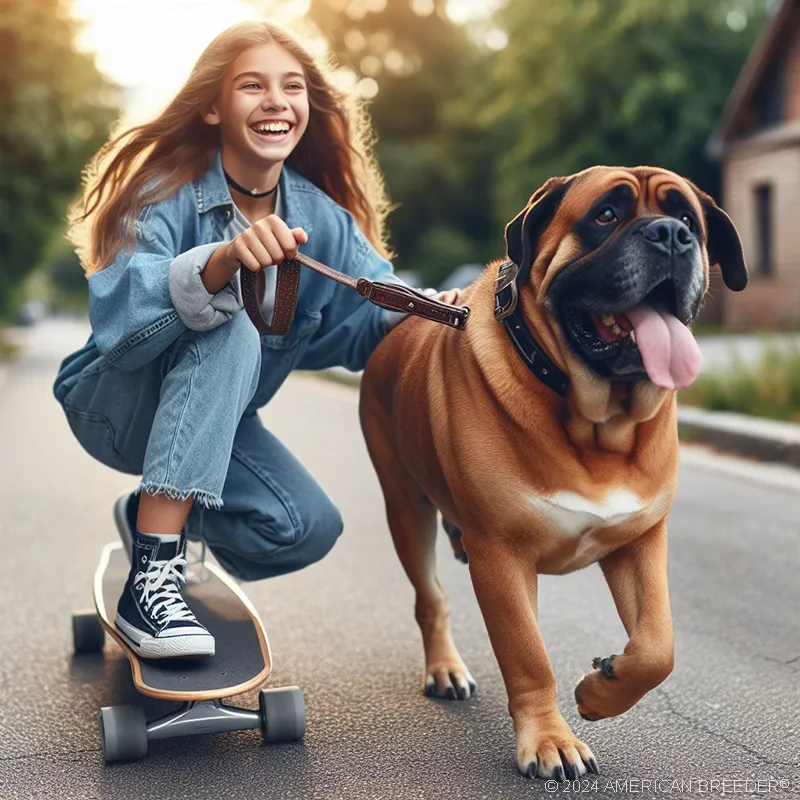 Owning a Boerboel requires careful consideration of various practical aspects to ensure their well-being and happiness. Their size and strength dictate the need for ample space both indoors and outdoors. Providing a comfortable sleeping area and regular exercise is essential for their physical and mental health.
Owning a Boerboel requires careful consideration of various practical aspects to ensure their well-being and happiness. Their size and strength dictate the need for ample space both indoors and outdoors. Providing a comfortable sleeping area and regular exercise is essential for their physical and mental health.
Budgeting for their care is another crucial consideration. While their dietary needs can be met with quality dog food, their size may lead to higher food costs.
Grooming requirements are minimal due to their short coat, but regular health check-ups and vaccinations are necessary to maintain their overall health and longevity. It's important to dedicate time and attention to their socialization and training needs to raise a well-adjusted and well-behaved companion.
Health and Care of the Boerboel Dog
As a breed, the Boerboel is generally healthy, but like all dogs, they may be predisposed to certain health issues. Hip and elbow dysplasia are common concerns due to their size, so regular orthopedic evaluations are advisable. Responsible breeding practices can help mitigate these genetic predispositions. Their short coat makes grooming straightforward, requiring occasional brushing to remove loose hair and maintain their skin health.
Their exercise needs are moderate, but regular physical activity and mental stimulation are essential for their well-being. Long walks, interactive play sessions, and engaging toys will keep them mentally sharp and prevent boredom-related behaviors. Adequate nutrition tailored to their size, age, and activity level is crucial for maintaining their overall health and energy levels.
Socialization and Compatibility of the Boerboel Dog
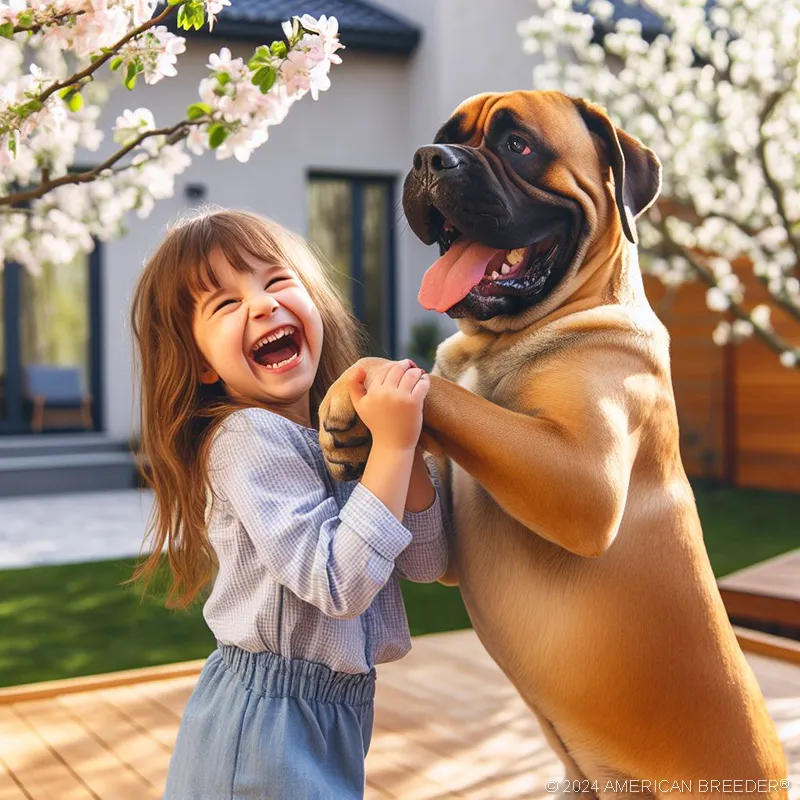 Boerboels are family-oriented dogs that thrive on companionship and interaction. Their socialization should begin early to ensure they grow into well-rounded and well-behaved adults. Exposing them to different environments, people, and animals during their critical socialization period helps prevent fearfulness and aggression.
Boerboels are family-oriented dogs that thrive on companionship and interaction. Their socialization should begin early to ensure they grow into well-rounded and well-behaved adults. Exposing them to different environments, people, and animals during their critical socialization period helps prevent fearfulness and aggression.
Their compatibility with children is generally positive, but supervision is important to prevent accidental injuries due to their size. Proper introductions to other pets are crucial, as their guarding instincts might lead to aggression towards unfamiliar animals. Training them to understand boundaries and interact appropriately with other dogs and pets fosters a harmonious household.
Living Arrangements and Environment for the Boerboel Dog
Boerboels thrive in a variety of living arrangements, as long as their physical and mental needs are met. Their size makes them adaptable to both spacious homes with large yards and more compact urban environments with regular access to outdoor spaces. However, a securely fenced yard is recommended to provide them with the freedom to move and play safely.
Considering their protective nature, Boerboels are well-suited to living in areas where security and guarding are necessary. Their presence alone can serve as a deterrent to potential intruders. Moreover, their versatility extends to climate adaptability, making them comfortable in different weather conditions. While they enjoy spending time outdoors, they also appreciate being a part of the family indoors, lounging by the fireplace or resting in a cozy corner.
Training and Obedience for the Boerboel Dog
Training a Boerboel requires a balanced approach that acknowledges their intelligence and independent nature. While they're eager to please, they can also be strong-willed, making consistent and positive reinforcement training essential. Focusing on basic obedience commands and early socialization builds a foundation for a well-behaved companion.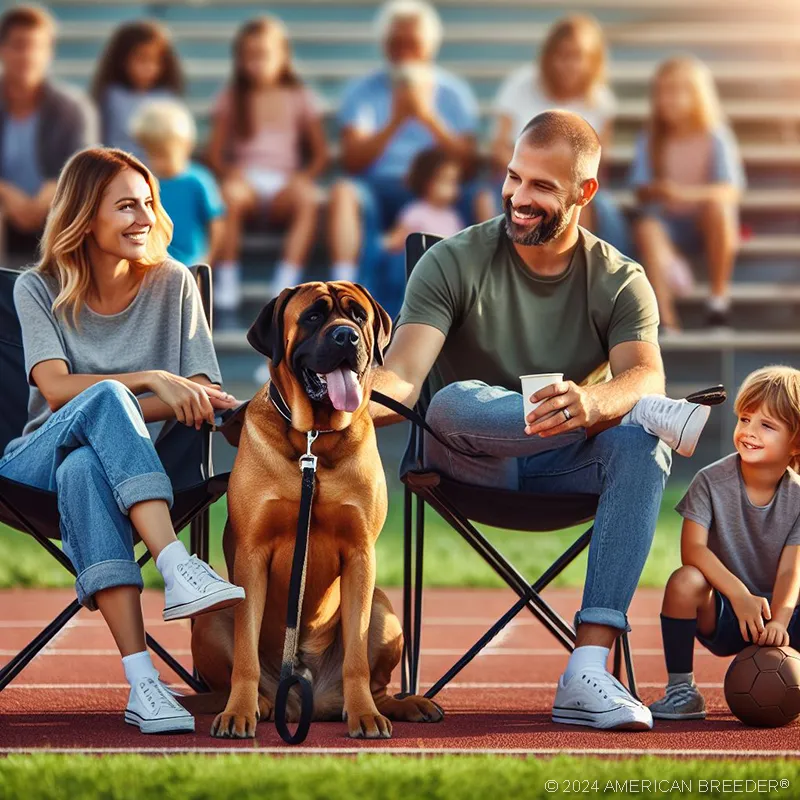 Advanced training can harness their natural instincts for specialized tasks, such as therapy or service work. Given their protective tendencies, providing them with a job or purpose can channel their energy positively. Training should include proper leash manners and walking etiquette, as their strength can make them challenging to manage if not properly trained.
Advanced training can harness their natural instincts for specialized tasks, such as therapy or service work. Given their protective tendencies, providing them with a job or purpose can channel their energy positively. Training should include proper leash manners and walking etiquette, as their strength can make them challenging to manage if not properly trained.
Exercise and Activity for the Boerboel Dog
Adequate exercise is key to a healthy and contented Boerboel. Their energy levels may not be as high as some other breeds, but regular physical activity is still essential. Daily walks, play sessions, and interactive games help them burn off energy and maintain a healthy weight. Engaging in mentally stimulating activities, such as puzzle toys and obedience training, prevents boredom-related behaviors.
The Boerboel's strength and agility make them excellent candidates for activities like agility courses and weight pulling. These activities tap into their natural abilities and provide both physical and mental stimulation. Engaging them in dog sports fosters a strong bond between owner and dog and contributes to their overall well-being.
Financial Planning for the Boerboel Dog
Owning a Boerboel comes with financial responsibilities beyond the initial purchase or adoption fee. Planning for ongoing expenses, such as high-quality food, regular veterinary care, grooming supplies, and training, is essential. Additionally, budgeting for potential medical emergencies or unexpected costs ensures that your furry companion receives the care they deserve.
Pet insurance is worth considering to provide financial assistance in case of unexpected health issues. Furthermore, planning for pet care during vacations or travel is crucial to ensure your Boerboel is well taken care of in your absence. By accounting for the financial aspects of ownership, you can provide your Boerboel with a comfortable and fulfilling life.
Overall Summary and Conclusion
In summary, the Boerboel Dog is a remarkable breed with a history steeped in protection, loyalty, and companionship. Their imposing appearance belies a gentle and devoted nature, making them cherished family members and guardians. From their origin as South African farm dogs to their role in modern households, Boerboels have left an indelible mark on the hearts of those who have the privilege of knowing them.
As you embark on your journey with a Boerboel, remember that responsible ownership requires commitment, knowledge, and a deep understanding of their unique characteristics. By providing proper care, training, and socialization, you'll cultivate a bond of trust and loyalty that will endure a lifetime. The Boerboel's legacy as a faithful and loving companion continues, and with your guidance, they will shine as an embodiment of strength, protection, and unwavering devotion.
Boerboel Dog Quick Reference Guide
Breed Background: Origin: South Africa | Breed Purpose: Guardian and protector | AKC Class: Working Group | Year Recognized by AKC: 2022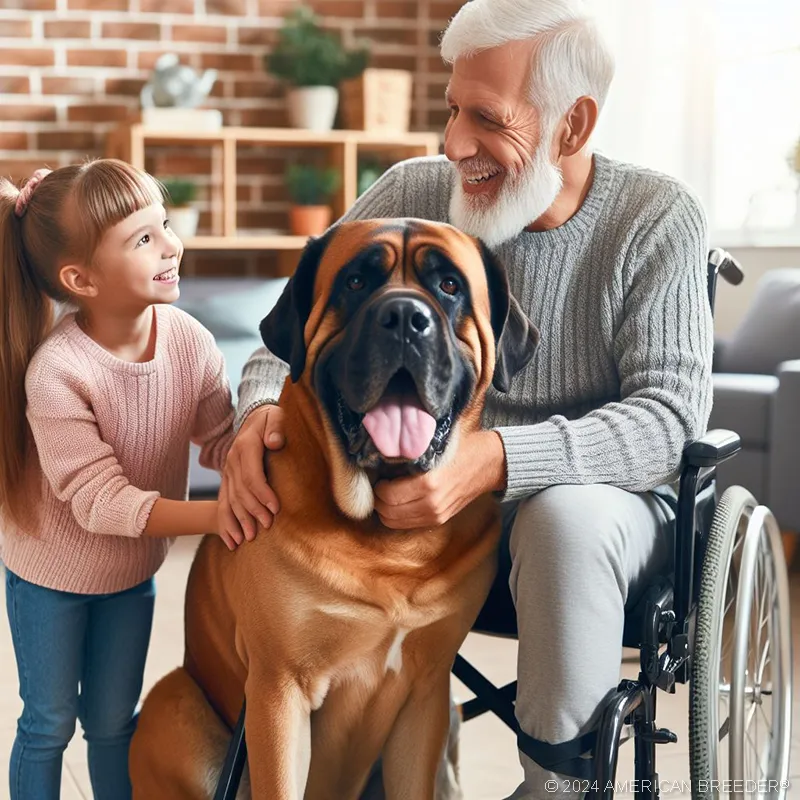 Appearance: Size: Large | Weight: 150-200 lbs | Coat Type: Short and dense | Colors & Patterns: Various shades of brown, brindle, or fawn | Distinctive Features: Muscular build, strong jaw, loose skin on face
Appearance: Size: Large | Weight: 150-200 lbs | Coat Type: Short and dense | Colors & Patterns: Various shades of brown, brindle, or fawn | Distinctive Features: Muscular build, strong jaw, loose skin on face
Temperament: Energy Level: 4/5 | Loyalty: 5/5 | Friendliness to Pets: 3/5 | Friendliness to Strangers: 2/5 | Trainability: 3/5 | Playfulness: 3/5 | Frequent Barker: 3/5 | Chase Instincts: 3/5 | Sense of Smell: 4/5 | Drive to Hunt: 3/5
Health & Care: Health Issues: Hip dysplasia, bloat, heart conditions | Lifespan: 10-12 years | Grooming Difficulty: Low | Exercise Needs: High
Socialization: Interaction with Children: Cautious, better with supervision | Interaction with Pets: Variable, early socialization important | Interaction with Strangers: Guarded | Elderly Compatibility: Vigilant watchdog | Ease of
Training: Moderate
Suitable Living Arrangements: Apartment: No | House: Yes | Rural Area: Preferred | Yard Size Requirements: Large, fenced yard
Training & Obedience: Trainability: 3/5 | Intelligence: 4/5 | Obedience: 3/5 | Problem-Solving: 3/5 | Easily Stimulated: 4/5 | Focus Level: 3/5 | Easily Distracted: 3/5
Financial Planning: Typical Price Range: $1500 - $4000 | Initial Expenses: Puppy vaccinations, supplies | Ongoing Annual Expenses: Food, vet visits
Breeding: Reproductive Maturity: 18-24 months | Litter Frequency: 1-2 litters per year | Litter Size: 6-10 puppies | Stud Cost: Varies | Breeding Challenges: Health screening, managing large litters
Did You Enjoy this Article? Share it and Help Us Spread the Word!
If you found this article helpful, we'd appreciate it if you could share it with your friends or link to it from your website, blog, or group! You can also use the convenient social share tabs on the left side of the screen to instantly share this page to your social media feed. For more ways to support and promote the American Breeder Community, visit our Share & Promote Together page for social media posts and memes you can copy and share. Your support means the world to us!
Disclaimer: The information provided in this article is for general informational purposes only and does not constitute legal, medical, financial, or professional advice. While we strive for accuracy, we make no representations or warranties regarding the completeness, accuracy, reliability, or suitability of the information. Please consult with a professional before making decisions based on the content provided. American Breeder Inc. assumes no responsibility for any errors or omissions or for the results obtained from the use of this information.
Did You Enjoy this Article? Share it and Help Us Spread the Word!
If you found this article helpful, we'd appreciate it if you could share it with your friends or link to it from your website, blog, or group! You can also use the convenient social share tabs on the left side of the screen to instantly share this page to your social media feed. For more ways to support and promote the American Breeder Community, visit our Share & Promote Together page for social media posts and memes you can copy and share. Your support means the world to us!
Disclaimer: The information provided in this article is for general informational purposes only and does not constitute legal, medical, financial, or professional advice. While we strive for accuracy, we make no representations or warranties regarding the completeness, accuracy, reliability, or suitability of the information. Please consult with a professional before making decisions based on the content provided. American Breeder Inc. assumes no responsibility for any errors or omissions or for the results obtained from the use of this information.
